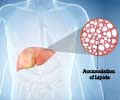Cyclodextrin dissolves cholesterol crystals and reduces atherosclerotic plaques. This is a promising therapeutic approach for treating atherosclerosis.

TOP INSIGHT
Cyclodextrin that dissolves cholesterol crystals and reduces atherosclerotic plaques could be a promising therapeutic approach for treating atherosclerosis.
The original idea for the test of cyclodextrin came from Chris Hempel, an American mother whose twin daughters are affected by a rare illness called Niemann-Pick Type C disease, in which cholesterol accumulates in the body. The children are being treated with cyclodextrin with promising results.
Hempel read about previous research on cholesterol crystals conducted by senior researcher Eicke Latz from the University Hospital Bonn and his colleagues from the Center of Molecular Inflammation Research (CEMIR) at the Norwegian University of Science and Technology (NTNU) in Trondheim. She contacted Dr. Latz to suggest that they test cyclodextrin as a possible treatment for atherosclerosis.
Dr. Latzis also an adjunct professor at CEMIR. Researchers from the Oslo University Hospital in Norway, and from Australia, the USA, Denmark and Sweden also contributed to the work.
Source-Eurekalert
 MEDINDIA
MEDINDIA




 Email
Email









